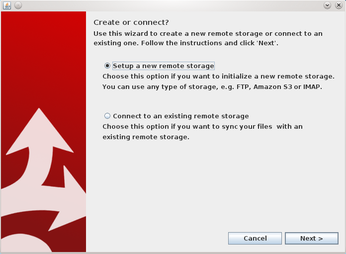Compile and Run Syncany on Ubuntu 11.04

Productivity Sauce
Syncany is a relatively young project, but it already garnered the attention of the open source crowd as a potential replacement for Dropbox. Syncany's major attraction is its support for a wide range of storage back-ends: from good old FTP, to Amazon S3, WebDAV, and even Picasa. Better yet, additional back-ends can be easily added via plugins.
While Syncany is far from ready for prime time, you can compile the current version of it from the source code to see for yourself what all this buzz is about.
First off, install the required packages using the following command (don't forget to enable Canonical Partners' repository in Synaptic first):
sudo apt-get install bzr sun-java6-jdk sun-java6-javadb ant libcommons-codec-java libcommons-cli-java libcommons-lang-java libcommons-collections3-java libcommons-logging-java libcommons-vfs-java libdom4j-java liblog4j1.2-java libjava-gnome-java libappframework-java libcommons-httpclient-java libj2ssh-java libcommons-net2-java
Next, you have to switch to Sun JRE as the default Java runtime environment. To do this, run the sudo update-alternatives --config java command and select the appropriate item. Fetch then Syncany's source code by running the bzr branch lp:syncany command. In the terminal, use the cd syncany/syncany command to switch to the syncany directory. Finally, build Syncany,and start the application using the following commands:
ant dist/bin/syncany.sh
If everything works properly, you should see Syncany's configuration wizard that guides you through the process of creating a synchronization profile. That's all there is to it.
comments powered by DisqusSubscribe to our Linux Newsletters
Find Linux and Open Source Jobs
Subscribe to our ADMIN Newsletters
Support Our Work
Linux Magazine content is made possible with support from readers like you. Please consider contributing when you’ve found an article to be beneficial.

News
-
Keep Android Open
Google has announced that, soon, anyone looking to develop Android apps will have to first register centrally with Google.
-
Kernel 7.0 Now in Testing
Linus Torvalds has announced the first Release Candidate (RC) for the 7.x kernel is available for those who want to test it.
-
Introducing matrixOS, an Immutable Gentoo-Based Linux Distro
It was only a matter of time before a developer decided one of the most challenging Linux distributions needed to be immutable.
-
Chaos Comes to KDE in KaOS
KaOS devs are making a major change to the distribution, and it all comes down to one system.
-
New Linux Botnet Discovered
The SSHStalker botnet uses IRC C2 to control systems via legacy Linux kernel exploits.
-
The Next Linux Kernel Turns 7.0
Linus Torvalds has announced that after Linux kernel 6.19, we'll finally reach the 7.0 iteration stage.
-
Linux From Scratch Drops SysVinit Support
LFS will no longer support SysVinit.
-
LibreOffice 26.2 Now Available
With new features, improvements, and bug fixes, LibreOffice 26.2 delivers a modern, polished office suite without compromise.
-
Linux Kernel Project Releases Project Continuity Document
What happens to Linux when there's no Linus? It's a question many of us have asked over the years, and it seems it's also on the minds of the Linux kernel project.
-
Mecha Systems Introduces Linux Handheld
Mecha Systems has revealed its Mecha Comet, a new handheld computer powered by – you guessed it – Linux.

